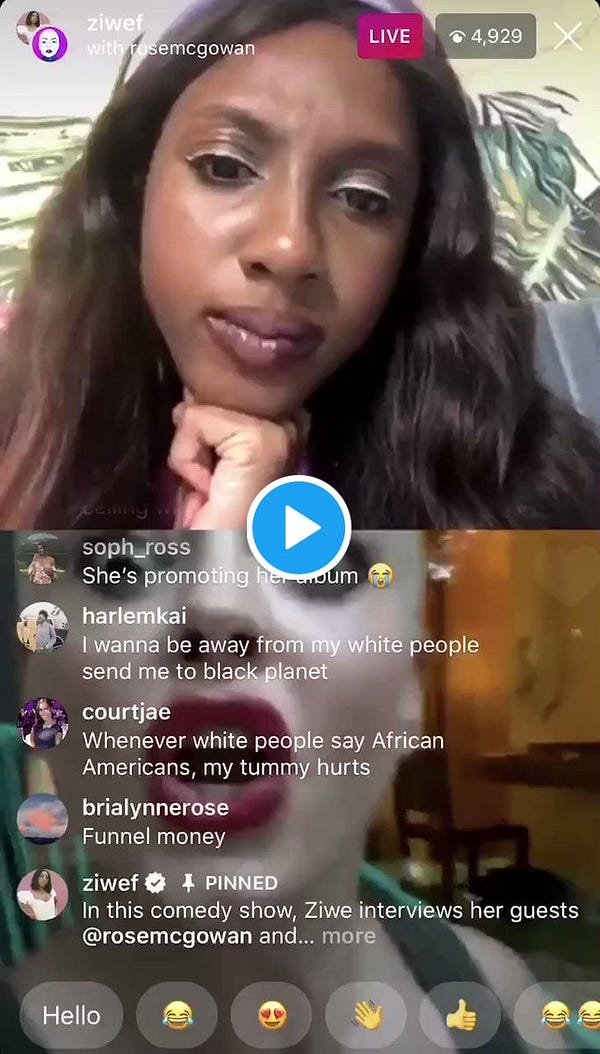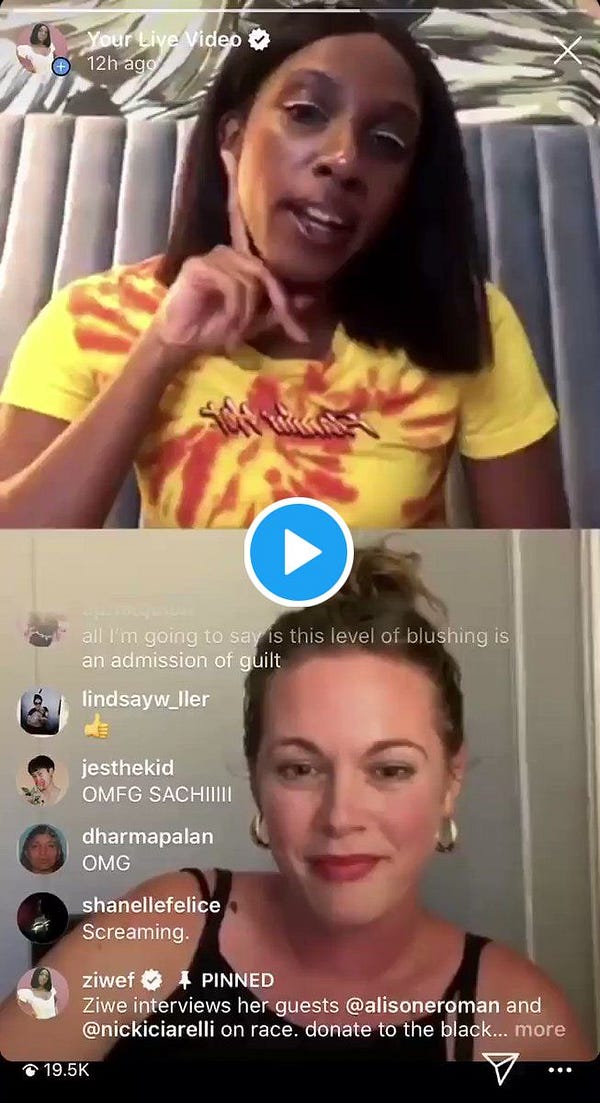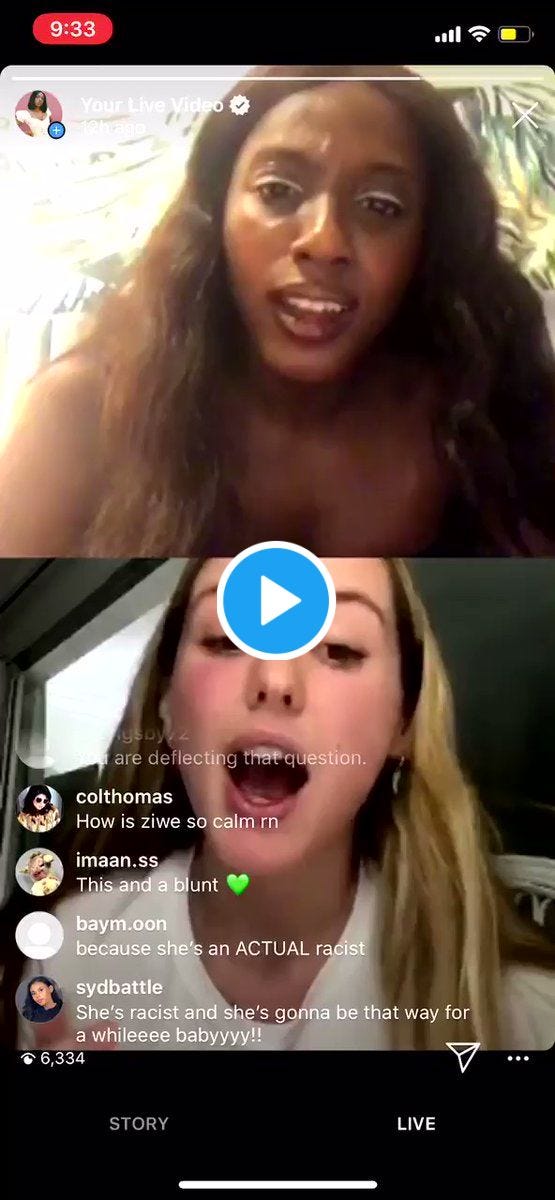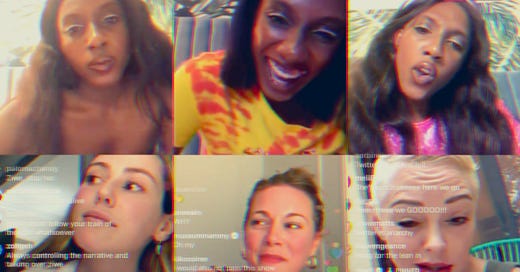Allyship Unhinged
Ziwe's interviews show what happens when white people try to perform anti-racism without politics.
“Hi, I’ve just been stabbed by someone famous and I’m not sure why they’re trying to kill me, but I’m in an alley. If you could send someone who’s not racist, that’d be fucking awesome.”
This is what actor and activist Rose McGowan said she would say if she were to call the police after being stabbed by Ziwe Fumudoh, a 28-year-old comedian and writer for Desus & Mero. She was telling Fumudoh this on an episode of Fumudoh’s increasingly popular weekly comedy show on Instagram Live on July 2.
Fumudoh, who goes by her first name professionally, pressed McGowan in this hypothetical 9-1-1 call, inching her face toward the selfie camera of her phone, her hand in the shape of a phone itself.
“OK great and what’s this person’s race?” Fumudoh asked.
McGowan gazed back at her own selfie camera, her mouth agape for a moment, before she stuck her tongue out, contorting her face in a way that suggested that she really didn’t want to tell Fumudoh that, yes, if she were calling the police because Fumudoh stabbed her, and then were asked to describe Fumudoh’s race, she would describe Fumudoh, who is Black, as Black.


It was clear that McGowan had watched other episodes of Fumudoh’s show on Instagram Live, in which Fumudoh, the host, interviews her guests with guiding questions meant to “bait” them into saying something racist. She was the third high-profile white woman to appear on the show since Fumudoh expanded her similar Baited YouTube series to IG Live in the wake of the coronavirus pandemic and the national uprising against racism and police violence.
McGowan’s interview came weeks after Fumudoh went straight to cam with Caroline Calloway, a failed influencer popularly detested among the extremely online crowd, and chided Calloway for asking for an ally cookie (jokingly, of course… I think…).
McGowan also spoke with Fumudoh one week after her interview with Alison Roman, the recipe writer and columnist who is currently “on hiatus” from the New York Times after making hypocritical and racist comments about Marie Kondo and Chrissy Teigen. Roman did badly enough that Fumudoh described the encounter this way to Vanity Fair:
When I asked, “Qualitatively, what do you like about Black people?” and her response was, “Um, I like their cooking and dancing,” I had to cut her off. I’m just gonna do you a favor and stop it before we go down this road. Watching her struggle to name five Asian people on the spot? That’s surprising!
Unlike Calloway and Roman, McGowan has been a very famous and highly scrutinized person for decades. I don’t take her for being naive, especially after being dragged on Twitter for comparing the n-word to the word “woman,” and so I’m sure she definitely knew she’d be baited into doing something like racially profiling Fumudoh during a hypothetical 9-1-1 call. In lieu of actually knowing what to say instead, however, a face scrunch will have to do.
Again, this is the point of Fumudoh’s show — to ask people uncomfortable questions about race or that make them question their understanding of their own racism. Fumudoh launched the show in 2017 on YouTube with Above Average, calling it Baited with Ziwe. She renamed it Ziwe: A Race-Baiting Series and expanded her interview pool beyond her white coworkers for its second season released this February.
And it’s really fucking funny, because outside of this Instagram Live experiment with a parade of canceled white women and other various comedians and artists, Fumudoh’s series really is a comedy show. Even if Roman’s and Calloway’s and McGowan’s earnestness to be taken seriously as anti-racist allies misconstrues the show’s intent, the jokes, the editing, the musical cues — it’s all so good. Fumudoh shines as the most clever “master baiter” (her words, not mine). I watched the entire series on YouTube after Fumudoh’s interview with Calloway got the influencer trending on Twitter, and I have a few favorite primers, which are nearly the entirety of Fumudoh’s second season:
“White Bosses” in which Fumudoh, with the help of Heben Nigatu, gets her white male boss Josh Gondelman to pretend to fire activists and writers such as Maya Angelou and James Baldwin if he was their boss.
“Black Women” in which Fumudoh gets comedian Sydnee Washington to host and ask her loaded questions that she wrote for herself.
“Model Minorities” in which Fumudoh tries and fails to get comedian Aparna Nancherla to do racist accents during a game of minority celebrity heads up.
The season is far different from her earlier episodes, where Fumudoh’s white coworkers openly cringe when she reveals that she’s successfully goaded them into saying something racist or reinterprets their responses so that they sound racist. Some of that magic still exists in Fumudoh’s Instagram Live series, where comedians like Dana Donnelly and Jared Goldstein visibly panic when they feel like their racism is showing — less an acknowledgment of racism than a realization that they’ve succumbed to the show’s premise. Fumudoh’s reign as the master baiter continues.
But it’s in those high-profile livestreams with Calloway, Roman, McGowan, and even in some of her conversation with Black playwright Jeremy O. Harris, that Fumudoh’s videos take on a different tone. Not necessarily because of Ziwe herself — she remains vibrant but calm in her questioning, filling the frame of her half of the livestream with her face when she wants to be dramatic and furrowing her eyebrows and curling her mouth into an open smile when she’s listening — but because of the agendas of her guests amid the present revolt and reckoning.
These white women are going on Fumudoh’s show seeking absolution and an opportunity to self-flagellate, because as people who have been on the other side of cancellation, they want to show that they’re the good kind of white women. They want to show that they’ve done the work, or have at least attempted to do the work, and have something to prove.
And yet intentions cannot mask ignorance.
Calloway’s interview was extremely chaotic, with her smiling as she told Fumudoh that she doesn’t know who Marcus Garvey, Huey P. Newton, or Fred Hampton are. She then seemed to give up right after she disclosed her lifelong hatred of rap, joking when Fumudoh asked about what she “qualitatively” likes about Black people that she’d never met a Black person. She also didn’t seem to realize that Fumudoh was ribbing her when she gassed up Calloway’s career flops as successes, asking, “How, and why not me, a Black woman?” It was a fucking trip, and that was just in the first eight minutes of the interview.
Roman’s responses were more serious but still revealed her failure to understand the premise of Fumudoh’s show. When Fumudoh asked her how many Black friends she had, Roman asked for what the definition of “friend” was here — saying that if it’s people who’d pick her up at the airport, then it would be “four to five,” out of the “12 to 13” friends she could depend on for airport pickups, total. When Fumudoh asked Roman if she ever did anything to bring on Black staff during her time at Bon Appétit, Roman explained away why she didn’t.


McGowan’s interview, meanwhile, went right the fuck off the rails several times, as she explained that she didn’t know she was white until she came to the U.S. as a child, and that her main mistake that led to her tweeting that comparison between the word “women” and the n-word was that she was high. When Fumudoh asked her if she’d ever been in blackface, she said no, but then recalls that she was looking at a photo of Alyssa Milano in blackface just the night before. (Fumudoh announced last week that Milano will be joining her on this week’s episode, Thursday at 8 p.m. ET., surely to insist that she’s not racist and clear up this whole blackface fiasco once and for all.)
It’s unclear how Fumudoh keeps booking these white women despite their inability to complete the assignment, and she says just as much in about every interview she’s done since her Instagram Live show took off. From Variety:
“There’s an element of performance coming from me, as a host, and coming from my guests, as people who are answering for their racial biases,” Fumudoh, who goes by Ziwe professionally, says. “I’m not there to judge their performances. I’m just there to critique why they feel the need to perform the fact that they have 4.5 Black friends.”
[...]
“At the end of every interview, I ask my guest, ‘Why did you come on the show?’ because I’m genuinely curious. I’m curious why you would want to volunteer yourself to talk about such a sensitive topic as race in front of 20,000 people who are commenting about how you’re answering your five favorite Asians too slow, ” she says, referring to one of her exchanges with Roman.
That’s really the question here. Why in the fuck would you, someone who is likely very out of your depth, think that this is what you need to be doing with your time? Why would you book yourself on a program that, even if it’s hosted in good faith, will likely lead to you showing your own ass regardless of how many other interviews you watch in preparation?
A part of this is ego, definitely — celebrities and public people and their giant egos may feel that this is how they can contribute to the eradication of racism, or something, or how they can show other people how to willingly go into a conversation about race underprepared, and be vulnerable and openly wrong. I’m sure an aspect of this ego comes from thinking that they are special and different and unlike the other fools who come onto this show because they surely won’t be baited into saying something racist, even when this goes against the very narrative that they’re supposed to espouse about their own ignorance facilitated by a white supremacist society.
But this is allyship without direction. These videos, while entertaining to me (someone who, sure, would love to think of herself as smarter on racism than Roman and Calloway and McGowan), are extreme versions of what we see from white people on social media — calls to “pay attention” and commitments to “listen and learn,” but without any substantial commitment to act or adopt a set of politics to use to define an ally’s responsibilities.
This isn’t a blanket statement for all displays of allyship, of course, but it rings true for white liberals who want to stand for something, but find themselves in a deeply segregated space online and are having trouble developing their political consciousness for what that looks like.
Without direction, it’s easy to then be looking for direction and absorb this idea from earnest Instagram posts shared by other people who also aren’t yet politically aligned that this is how you practice anti-racism: by going on a show to talk about race and politics just because its host asked you to over DM. That it’s less about what you stand for and what demands you’re making and how you’re supporting the demands of others, but instead about saying the right thing and carefully choosing language and the performance of making the right statement.
So much of Calloway’s and Roman’s interview responses were rooted in getting it right (both of them pointed out that they’re supporting Black authors by buying their books, while Roman said she wouldn’t entertain the idea of a recipe for “ally cookies”). They tried so hard to seem like they got it and were in on the joke, focusing on their presentation and verbiage, that they weren’t thinking critically about Fumudoh’s question and ended up saying racist things without realizing it.
It’s not that language doesn’t matter, but these deranged interviews are a particularly nutty example of what happens when people aimlessly try to be anti-racist without a political foundation or commitments. Other points along this spectrum are white people randomly Venmoing payments to Black people they don’t know, or know but aren’t close to, with notes like “For Self Care.” Or reading White Fragility, internalizing this championing of corporate anti-racism training functioning within capitalism, even though many Black people have said these trainings do little to support them as coworkers or employees, but are instead a quick and easy bandage for corporations wanting to look like they’re trying.


And it isn’t that the Calloways and the Romans and even the McGowans of the world all need to be activists or leading the way politically — in her current state, I would not want to participate in a revolution led by Caroline Calloway — but that everyone has to figure out their political consciousness and how to practice their politics in a way that feels meaningful to them.
Perhaps going on Fumudoh’s show and saying racist things when prompted feels meaningful as a political commitment as opposed to being a part of a group that is working toward police and prison abolition, or your own financial divestment or investment in these groups. And Fumudoh’s guests very well could be doing the latter, but their interviews at the very least show me that they’re still grasping at straws.
Regardless, I will continue watching Fumudoh’s interviews. Her perfected art of interviewing problematic people is absolutely magnetic, and reveals so much more about the person she’s interviewing than they realize, all the while keeping the conversation lively.
I can’t imagine what Alyssa Milano will have to say for herself tonight, or what parts of her interview will get her name trending this evening (though it will probably include her response on wearing blackface). And I’m looking forward to seeing who else will go on Fumudoh’s show, looking to atone for their racism and display their neatly performative allyship next.
Update, 2:05 p.m. ET: This post initially spelled Huey P. Newton’s name wrong. Ugh.
Screenshots via Ziwef/Instagram; Remix by Samantha Grasso






Thank you for writing on this! I want an academic thesis written on Alison Roman's appearance alone. I can't bring myself to watch the entire interview but it's baffling why you would say that you watched previous interviews and then admit: I didn't actually look up any of the historical figures you mentioned because I wanted to be "real." Like maybe you could do some research beforehand? That would also show respect for Ziwe and yourself? Caroline's goal in going on the show is a bit more clear (she is a chronic attention seeker at all costs) but Alison's intentions are so bizarre and ill-advised.
Huey P. Newton